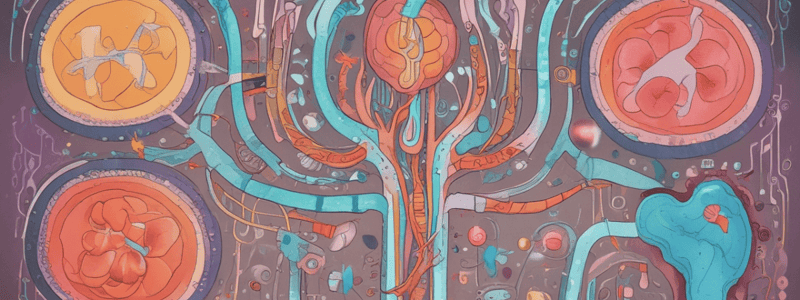Podcast
Questions and Answers
What is the primary function of antidiuretic hormone (ADH) in the kidneys?
What is the primary function of antidiuretic hormone (ADH) in the kidneys?
- To stimulate water reabsorption in the collecting ducts (correct)
- To promote glucose uptake and storage
- To convert angiotensinogen into angiotensin I
- To regulate sodium and potassium balance
Which hormone is responsible for promoting sodium reabsorption and potassium excretion in the kidney?
Which hormone is responsible for promoting sodium reabsorption and potassium excretion in the kidney?
- Renin
- Insulin
- ADH
- Aldosterone (correct)
What is the function of juxtaglomerular cells in the kidney?
What is the function of juxtaglomerular cells in the kidney?
- To regulate water balance
- To convert angiotensin I into angiotensin II
- To promote sodium reabsorption
- To secrete renin to restore blood pressure (correct)
What is the characteristic of the descending limb of the loop of Henle?
What is the characteristic of the descending limb of the loop of Henle?
What is the primary function of HDL in the body?
What is the primary function of HDL in the body?
What is the enzyme that converts angiotensinogen into angiotensin I?
What is the enzyme that converts angiotensinogen into angiotensin I?
What is the primary hormone that controls the absorptive state?
What is the primary hormone that controls the absorptive state?
What is the primary effect of Syndrome of Inappropriate Antidiuretic Hormone (SIADH)?
What is the primary effect of Syndrome of Inappropriate Antidiuretic Hormone (SIADH)?
What is the primary function of gluconeogenesis?
What is the primary function of gluconeogenesis?
What is the primary effect of diabetes insipidus?
What is the primary effect of diabetes insipidus?
What is the primary function of LDH in the body?
What is the primary function of LDH in the body?
What is the primary characteristic of a base?
What is the primary characteristic of a base?
What is the major cation found in the intracellular fluid (ICF)?
What is the major cation found in the intracellular fluid (ICF)?
Which of the following is a characteristic of an acid?
Which of the following is a characteristic of an acid?
What is the primary function of a buffer in the body?
What is the primary function of a buffer in the body?
What is the major anion found in the extracellular fluid (ECF)?
What is the major anion found in the extracellular fluid (ECF)?
What is a characteristic of a base?
What is a characteristic of a base?
What is SIADH?
What is SIADH?
What is the primary function of the ascending limb of the nephron's loop of Henle?
What is the primary function of the ascending limb of the nephron's loop of Henle?
What are the fluid compartments in the body?
What are the fluid compartments in the body?
What are the three hormones that mediate fluid and electrolyte balance?
What are the three hormones that mediate fluid and electrolyte balance?
What is the Major ICF anions?
What is the Major ICF anions?
Where is aldosterone produced?
Where is aldosterone produced?
What is the result of renin's action on angiotensinogen?
What is the result of renin's action on angiotensinogen?
What is the substrate for the enzyme renin?
What is the substrate for the enzyme renin?
What is the role of renin in the renin-angiotensin-aldosterone system?
What is the role of renin in the renin-angiotensin-aldosterone system?
What is the function of aldosterone?
What is the function of aldosterone?
Study Notes
Hormones and Fluid Balance
- Antidiuretic hormone (ADH), Aldosterone, and Natriuretic peptides (ANP and BNP) mediate fluid and electrolyte balance.
- ADH stimulates water reabsorption in the kidneys' collecting ducts, regulating water balance and concentrating urine.
- Aldosterone promotes sodium retention and potassium excretion to regulate blood pressure and fluid balance.
Fluid Compartments
- The body's fluid compartments include intracellular fluid (ICF) and extracellular fluid (ECF), which includes plasma and interstitial fluid.
- Major ICF cation: Potassium (K+)
- Major ICF anions: Proteins and Phosphate (PO4-)
- Major ECF cation: Sodium (Na+)
- Major ECF anions: Chloride (Cl-) and Bicarbonate (HCO3-)
Acids and Bases
- An acid is a substance that can donate a hydrogen ion (H+).
- A base is a substance that can accept a hydrogen ion (H+).
Buffers
- A buffer is a solution that resists changes in pH when acids or bases are added, maintaining a stable pH in the body.
Lipid Metabolism
- HDL (High-Density Lipoprotein) transports cholesterol from cells and tissues back to the liver for disposal, considered "good" cholesterol.
- LDL (Low-Density Lipoprotein) carries cholesterol from the liver to cells and tissues, considered "bad" cholesterol.
Gluconeogenesis
- Gluconeogenesis is the metabolic process by which glucose is synthesized from non-carbohydrate sources, using amino acids, glycerol, and lactate.
Renin-Angiotensin-Aldosterone System (RAAS)
- Renin, secreted by juxtaglomerular cells, converts angiotensinogen into angiotensin I, then angiotensin II, a potent vasoconstrictor.
- Aldosterone promotes sodium retention and potassium excretion to regulate blood pressure and fluid balance.
Nephron Function
- In the nephron's loop of Henle, the descending limb is permeable to water, while the ascending limb is impermeable to water.
Syndrome of Inappropriate Antidiuretic Hormone (SIADH)
- SIADH is a condition where excessive ADH is released, leading to water retention, dilutional hyponatremia, and concentrated urine.
Diabetes Insipidus
- Diabetes insipidus is a disorder characterized by an insufficiency of ADH, leading to polyuria and polydipsia, resulting in dilute urine and increased plasma osmolality.
Studying That Suits You
Use AI to generate personalized quizzes and flashcards to suit your learning preferences.
Description
Test your knowledge of hormone functions in the human body, including ADH, aldosterone, and the juxtaglomerular cells' role in regulating blood pressure.




